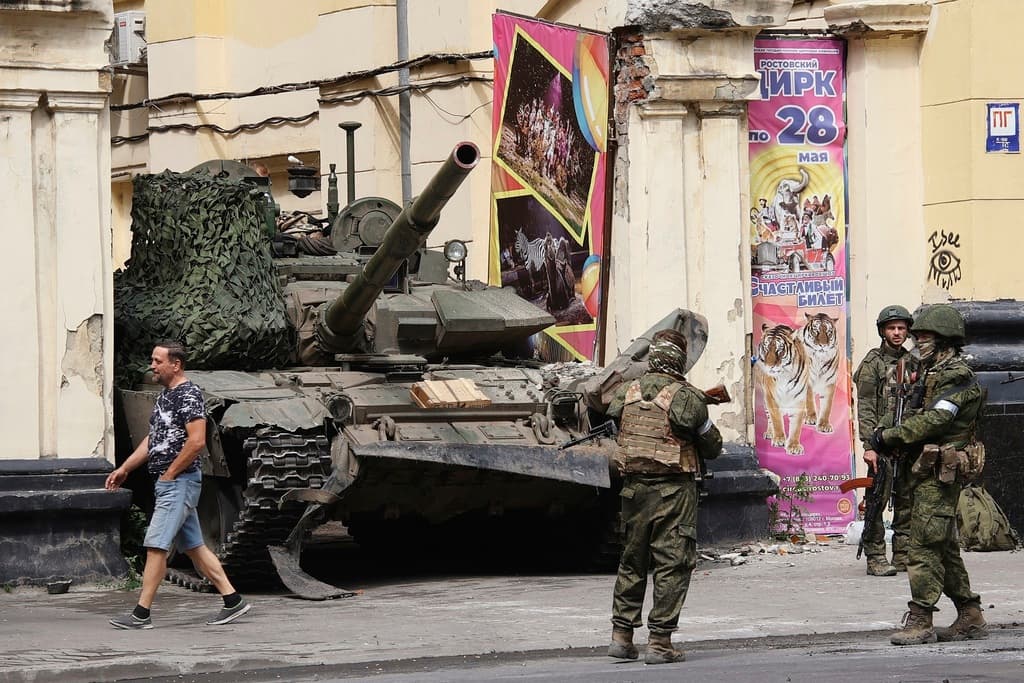Chechen Forces Racing to Rostov To Engage Mercenaries Who Have Turned on Russia
A column from the mercenary Wagner Group is reported to be halfway to Moscow — and under attack from the air.

BERLIN — Heavily armed Chechen forces under the head of the Chechen Republic, Ramzan Kadyrov, are reportedly en route to Rostov-on-Don to engage Russian Wagner mercenary fighters who have occupied the city in Russia’s south.
In videos posted to social media, Wagner fighters rolled on Friday into Rostov in armored vehicles and tanks in what appears, for now, to be a nearly bloodless takeover of at least part of the city.
On Friday night, Russian generals and military authorities accused militia chief and head of the Wagner paramilitary company, Yevgeny Prigozhin, of inciting insurrection in Russia and attempting a coup against the Russian state.
Wagner fighters surrounded and occupied a military headquarters at Rostov and other parts of the city, and videos circulating on social media show Mr. Prigozhin in Rostov’s Southern Military District Headquarters, a vital command node in Russia’s war against Ukraine.
Russian units stationed at the Southern Military District Headquarters have fought in Ukraine’s Donetsk region as well as the Zaporizhzhia region. Given the District’s proximity to Ukraine, Wagner’s movements may disrupt Russia’s lines of communication, supplies, and reinforcements to Russian positions in the Zaporizhzhia and Donetsk regions.
These two regions are increasingly seen as targets for the Ukrainian counteroffensive, and disrupting the flow of materiel to southern and eastern Ukraine from Russia could aid Ukrainian forces in their push toward Crimea.
Other videos show Wagner forces in Russia’s Voronezh region, roughly midway between Rostov and Moscow, with multiple tanks, infantry fighting vehicles, and several surface-to-air missile systems. Other videos show Russian helicopters firing at ground targets in Voronezh.
Rybar, a pro-Russian military Telegram channel, reported a column of Wagner forces passed Yelets, a town roughly midway between Rostov and Moscow.
The extraordinary developments in Russia come on the heels of an explosion at a Wagner mercenary base in Ukraine that killed many of Mr. Prigozhin’s fighters. Mr. Prigozhin claimed the attack was a deliberate strike by the Russian Ministry of Defense against his force, motivated by frictions between the groups.
In a video that surfaced today on social media, an armed and camouflaged Mr. Prigozhin is in conversation with Russia’s deputy minister of defense, Yunus-bek Yevkurov, at what appeared to be the Southern Military District Headquarters.
Mr. Prigozhin explained to Mr. Yevkurov that his Wagner forces came to Rostov to talk with Russia’s defense minister, Mr. Shoigu, and vowed to blockade Rostov and march on Moscow if his demands were not met.
Although fighting on the ground at Rostov seems limited, videos on social media show several attack helicopters and fighter jets falling out of the sky in flames, presumably shot down by Wagner. In other videos, explosions are heard at Rostov.
Mr. Prigozhin claimed in his conversation with Mr. Yvkurov that Wagner had already downed several aircraft and vowed to bring down any additional aircraft that the Russian Ministry of Defense sent against his forces.
The mercenary leader also claims to have 25,000 men in Russia at the ready, though it is not possible to verify his figure. The Russian military apparatus, in any event, appears to take Mr. Prigozhin’s threat seriously.
Video evidence shows Russian soldiers setting up multiple blockades on the M4 and M2 highways leading to Moscow. The blockades comprise sandbags, military vehicles, and heavy weaponry.
President Putin addressed the unrest in southern Russia in a nationally broadcast address today, calling the events “an armed rebellion,” and a “betrayal of our people.”
Mr. Putin further characterized Wagner’s actions as “a stab in the back” and drew historical parallels to the events of 1917, when Russia plunged into revolution and civil war following defeats on the battlefield during World War I.
Vowing to protect the Russian state from “any threats,” Mr. Putin warned that consequences would be severe and that insurrectionists would face “inescapable punishment.”

